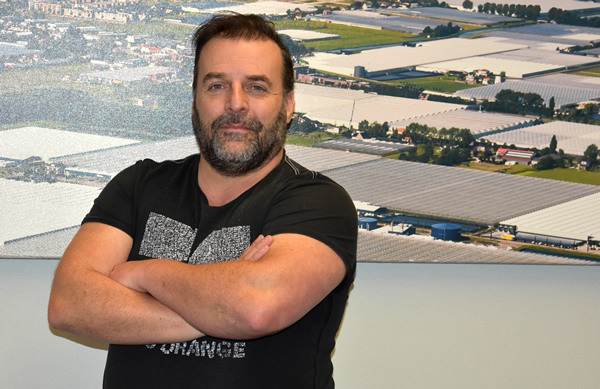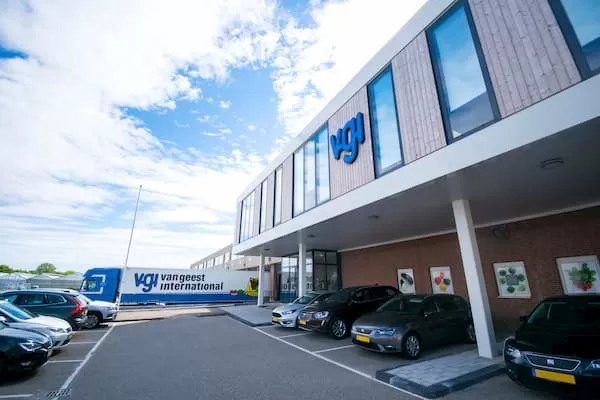Last year, in the Netherlands, Van Geest International (VGI) completed construction on their newest building. This exporting company had already built new premises of just under 3,000m2 in 2015. Barely four years later, they added another 1,900m2. But last year wasn't an unqualified success for the business. "Don't worry; we're doing very well. We were well in the black last year. We're just used to doing better. COVID-19 and Brexit posed challenges. We needed our business spirit. Was I concerned? No, but we stayed alert," says Philip van Geest.

UK totally unprepared for Brexit
"Brexit has had a huge impact. Trade has become more expensive. But besides that, it's resulted in a lot of paperwork. From the Dutch side, we prepared as well as we could for Brexit. As exporters, we have a link to the carriers like DG Daily Fresh Logistics and Freight Line's systems. The KCB [Dutch Quality Control Bureau] is to introduce declaration and phytosanitary certificate requirements. That's from 1 April. But we'll find our way around that too. In the United Kingdom, however, they weren't prepared at all."
"They work with a very outdated system. That means we have to enter all the export documentation manually. We can do that; we're even good at it. But that's an administrative job. Some kind of customs union would be great. That will cut out all this paperwork. I'm calling on the Dutch Government to ask the British Government about this. It also doesn't help that orders have to be closed much earlier. That service is suffering because of all the red tape. It's almost impossible to load a single extra pallet of tomatoes at 11:30 anymore," says Philip.
"Added to that, our products' prices have increased considerably. Documentation can cost anything from €0.15 to €1 per box. That depends on the order's size. We have products from third countries that we re-export from the Netherlands. Extra import tariffs apply to these. So, these items' costs are even higher. For Moroccan tomatoes, for example, the tariff is eight percent. That's all adds up."
That was reason enough for VGI not to fix prices for the entire season last year. Nevertheless, the exporter isn't concerned that the Netherlands' export position will be compromised. "The UK is by no means self-sufficient. The cultivation projects partly started from the Netherlands aren't all equally successful. It's not Russia where Putin just orders a few hundred hectares to be expanded. Things are a bit different in England. We also have no ambition whatsoever to participate in some kind of greenhouse project," continues Philip.
Nor would this fit in with the company. VGI has been working with Dutch greenhouse vegetable growers for years. That's via the large growers' associations. These lines are supplemented by fixed supplies from unaffiliated farmers. That's for specific products. "We're confident about the new greenhouse vegetable season."
"The advantage is that, in our trade, we work with healthy food. That's become more important these days. Last year, greenhouse vegetables sales were reasonably good. I have no reason to fear a major dip this year. In 2020, certain products got hit the hardest. These were things like cresses and the more luxurious exotics," explains Van Geest.

Broad sales scope
"The coronavirus pandemic has certainly affected us. Some of our clients supply food services, caterers, schools, and institutions. These all stopped functioning last year. In Germany, the government aid is so good they're less likely to look for alternative sales. In England, these businesses switched much quicker. That was to options like delivery and assembling vegetable boxes."
This Dutch export company is going to try and broaden its sales scope. "Currently, 80 to 85% of our trade still goes to the United Kingdom and Germany. We'd like to spread our sales further to places like France and Scandinavia. We're not so keen on Eastern Europe," admits Philip.
VGI has also begun putting together consumer vegetable boxes. "The first time, we sold 1,100 boxes. That went well, but the volume gradually decreased. But we mainly wanted to send people a message. That it was ridiculous that the stores' shelves were empty, while our warehouse was full. We've never focused on supermarkets. I recently heard that a supermarket (AH ed.) is fining their suppliers. That's if their deliveries are short or late, due to COVID-19. That reinforces the value of our strategy to me."
Philip and his brothers, Wim and René, run the company. Their father, Rien (MLS) van Geest founded it in 1974. Over the years, the company has grown into an organization with more than 60 employees. Dad Rien (87) still comes into work for a few hours every day. "MLS is VGI. And we're grateful that he's still here every day", says Philip.
The company relocated in 1991. "At the time, we wondered if we had moved to the correct location. But, we remain happy where we are. There's a lot of new construction in the area. We're close to the port and the A20 motorway. That saves us valuable time," Philip concludes.
For more information:
Philip van Geest
Van Geest International
41 Jogchem van der Houtweg
2678 HA, De Lier, NL
Tel: +31 (0) 174 514 300
Email: [email protected]
Website: www.vgibv.nl










